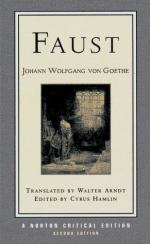Faust. O had I ne’er been born!
Mephistopheles [appears without]. Up!
or thou’rt lost! The morn
Flushes the sky.
Idle delaying! Praying and playing!
My horses are neighing,
They shudder and snort for the bound.
Margaret. What’s that, comes up
from the ground?
He! He! Avaunt! that face!
What will he in the sacred place?
He seeks me!
Faust. Thou shalt live!
Margaret. Great God in heaven! Unto thy judgment my soul have I given!
Mephistopheles [to Faust]. Come! come! or in the lurch I leave both her and thee!
Margaret. Thine am I, Father! Rescue
me!
Ye angels, holy bands, attend me!
And camp around me to defend me I
Henry! I dread to look on thee.
Mephistopheles. She’s judged!
Voice [from above]. She’s saved!
Mephistopheles [to Faust]. Come thou to
me!
[Vanishes
with FAUST.]
Voice [from within, dying away]. Henry! Henry!
NOTES.
[Footnote 1: Dedication. The idea of Faust had early entered into Goethe’s mind. He probably began the work when he was about twenty years old. It was first published, as a fragment, in 1790, and did not appear in its present form till 1808, when its author’s age was nearly sixty. By the “forms” are meant, of course, the shadowy personages and scenes of the drama.]
[Footnote 2: —“Thy messengers”—
“He maketh the winds his-messengers,
The flaming lightnings his ministers.”
Noyes’s Psalms,
c. iv. 4.]
[Footnote 3: “The Word Divine.” In translating the German “Werdende” (literally, the becoming, developing, or growing) by the term word, I mean the word in the largest sense: “In the beginning was the Word, &c.” Perhaps “nature” would be a pretty good rendering, but “word,” being derived from “werden,” and expressing philosophically and scripturally the going forth or manifestation of mind, seemed to me as appropriate a translation as any.]
[Footnote 4: “The old fellow.” The commentators do not seem quite agreed whether “den Alten” (the old one) is an entirely reverential phrase here, like the “ancient of days,” or savors a little of profane pleasantry, like the title “old man” given by boys to their schoolmaster or of “the old gentleman” to their fathers. Considering who the speaker is, I have naturally inclined to the latter alternative.]
[Footnote 5: “Nostradamus” (properly named Michel Notre Dame) lived through the first half of the sixteenth century. He was born in the south of France and was of Jewish extraction. As physician and astrologer, he was held in high honor by the French nobility and kings.]
[Footnote 6: The “Macrocosm” is the great world of outward things, in contrast with its epitome, the little world in man, called the microcosm (or world in miniature).]




